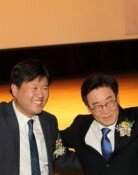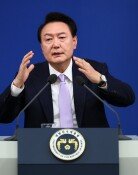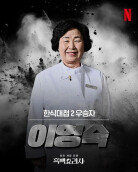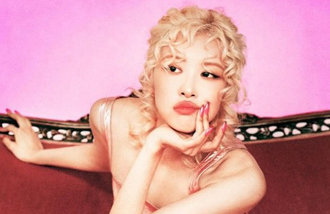The first president to skip national assembly opening since democratization
The first president to skip national assembly opening since democratization
Posted September. 03, 2024 07:55,
Updated September. 03, 2024 07:55
The 22nd National Assembly finally held its opening ceremony on Monday, a full 96 days after the start of its term. This marks the latest delay since the current Constitution was established in 1987, making it a troubling milestone in what’s known as the ‘87 System.’ Even more striking is that President Yoon Suk Yeol chose not to attend, becoming the first president under this system to skip the opening. The presidential office justified this unprecedented move, stating, "It is only appropriate to invite the President after the National Assembly, plagued by excessive special investigations and impeachment attempts, returns to normal." As a result, the 22nd National Assembly has set two unfortunate records: the longest delayed opening and the first absence of a president at such an event.
The substantial delay in the opening ceremony stems largely from a fierce power struggle between the ruling and opposition parties, particularly the opposition, which holds the majority in the Assembly. Originally scheduled for July 5, the ceremony was delayed after opposition parties, led by the Democratic Party of Korea, pushed through the Special Prosecutor Act related to the tragic death of Marine Corps Corporal Chae, leveraging their overwhelming victory in the April 10 general elections. In response, the People Power Party declared a boycott and suggested that the President should not attend. The ceremony was postponed indefinitely, only taking place yesterday, with the start of the Assembly's first regular session. It was held amidst a recent, albeit fragile, wave of cooperation between the ruling and opposition parties, marked by the passage of the first public welfare bills and a meeting between party leaders.
The ruling party attributes President Yoon's absence to the relentless political strife that the major opposition party instigated, urging the opposition to change its approach. "We can't help but suspect that the opposition would use the President’s attendance for protest rallies and to humiliate him," a presidential spokesperson stated. This comment alludes to the conduct of some opposition lawmakers during last year’s policy address, where they refused to shake hands with President Yoon and even told him to "step down."
However, President Yoon's decision to skip this opening ceremony is deeply disappointing. Regardless of how much blame can be placed on the National Assembly or the opposition, as the head of the executive branch, the President should uphold a minimum level of respect for the National Assembly, the institution representing the people. While President Yoon lamented last week that "this is the first time I've encountered such a situation in the National Assembly," he has now made a choice that no other president has made. Previous presidents faced similarly turbulent political environments, yet none opted to miss the opening ceremony of the National Assembly.
Furthermore, President Yoon appears to be overlooking a critical reality: with a National Assembly dominated by the opposition, smooth governance is impossible without their cooperation. As the President, who bears ultimate responsibility for the government, he cannot afford to ignore or dismiss a National Assembly controlled by the majority opposition. Was there truly no one in the presidential office in Yongsan who advised him to attend, regardless of the circumstances? Even if it requires stepping back or compromising, effective politics is ultimately about finding a way to win in the end.







